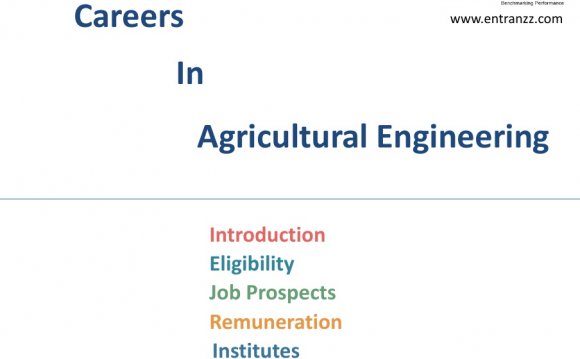
Agricultural engineers improve farming practices using science and technology. They design enhanced navigation and control systems for farming machinery. Working with scientists who specialize in plant production and use (called agronomists), agricultural engineers help to develop improved crops using biological applications. They also assist in managing the environmental impact of large farms, and in conserving water resources. In addition, agricultural engineers are working on developing certain kinds of algae and other biomass which can be used as fuel.
Many agricultural engineers focus on a single specialty, like food and bioprocess engineering, machinery design, or environmental engineering. They may work in the areas of management, production, research and development, or sales.
Work Environment
Agricultural engineers hold over 2, 700 jobs.
The table below shows how agricultural engineering jobs are distributed among different industries:
- Architectural, engineering, and related services – 17%
- Federal government, excluding postal service – 17%
- Agriculture, construction, and mining machinery manufacturing – 12%
- Food manufacturing – 11%
- Educational services; state, local, and private – 7%
Agricultural engineers may also work in offices, laboratories, and classrooms.
How to Become an Agricultural Engineer
High school students who want to become an agricultural engineer should study mathematics (like trigonometry, algebra, and calculus) and science (like chemistry, biology, and physics).
A bachelor's degree is typically required to start out in agricultural engineering. Undergraduate students of agricultural engineering study in classrooms, laboratories, and the field for 4 years before receiving a bachelor's degree. They study subjects like mathematics, engineering principles, and science. Cooperative programs, which are available in most universities and colleges, let students finish their degree while simultaneously receiving valuable experience in their field.
These university programs are evaluated by the Accreditation Board for Engineering and Technology (ABET).
Licensing
Licenses are required for agricultural engineers who work with the public directly. Agricultural engineers who have received their license are called professional engineers (PEs). To receive a license, an engineer must have:
- A degree from an ABET-accredited engineering program
- A passing score on the Fundamentals of Engineering (FE) exam
- Relevant work experience, typically at least 4 years
- A passing score on the Professional Engineering (PE) exam
Every state's licensing requirements are different. In some states, professional engineers must take further courses in their field, or else they lose their license. State licenses are typically valid in other states, depending on the particular requirements for licensure in that state.
The median salary of an agricultural engineer is more than $71, 000. The median salary is the salary at which 50% of the workers earned more and 50% earned less. The lowest 10% of engineers earn less than $42, 000, and the highest 10% earn more than $115, 000.
The following table shows the industries which employ the most agricultural engineers, as well as the median salary of agricultural engineers in those industries:
- Architectural, engineering, and related services – $78, 940
- Food manufacturing – $77, 670
- Federal government, excluding postal service – $74, 770
- Agriculture, construction, and mining machinery manufacturing – $63, 310
- Educational services; state, local, and private – $52, 450
Job Outlook
It's estimated that job prospects for agricultural engineers will grow by 9% in the next decade. This growth is slower than usual, when compared to the average occupation.
The technologies being developed by agricultural engineers are redefining the way we make food and other products, the way we manage our water resources, and the way we get and use fuel. Also, agricultural machinery and equipment is continually being rethought and redesigned, which creates more jobs for agricultural engineers.
RELATED VIDEO












